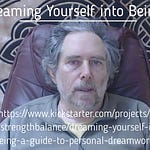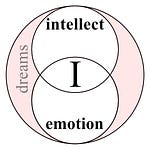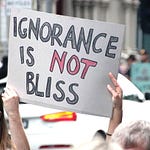Creativity is the most important tool. It can’t be taught, but you can learn it.
“All phenomena are real in some sense, unreal in some sense, meaningless in some sense, real and meaningless in some sense, unreal and meaningless in some sense, and real and unreal and meaningless in some sense.”
— Robert Anton Wilson, futurist
The Three and One More
We recognize three foundational areas in counseling, but there is an overlooked fourth. The three areas are, first, conscious reason and reflection. Second, the things below our reasoning self that I call the subconscious. Third, one’s neurology which includes one’s body and awareness. We are somewhat aware of our body and mostly unconscious of our neurology, which is not the same as subconscious.
Psychotherapy stops here. In Western culture, the mind is controlled, the body is taboo, and one’s neurology—like one’s emotions—are overlooked or repressed. The result is unintegrated people. Many dysfunctions reflect our inability to retain balance in response to daily stress.
The fourth angle is creativity and its three sisters: imagination, insight, and inspiration. I recognize creativity as distinct. Working as a therapist and practitioner in many fields, I see a lack of creativity. The lack is in people, not the separate disciplines.
Creativity is a thing in itself, and it’s our most advanced skill. It is more difficult to be successfully creative in any field than it is to be competent. Creativity is also disruptive both to the normal process and the educational program of every field. For example, if at any point in your training you “get creative,” you will inevitably stray from the standard.
What’s more, most creative ideas fail most of the time, and every field discourages failure. But to be successfully creative you must embrace failure. As I tell my clients as I encourage them to be creative, “Don’t expect to succeed. That’s not your goal. Your goal is to envision new possibilities.”
In simplistic terms, education trains us to control our intellect. Accepting a profession trains us to repress the instincts that connect us to our bodies. The pressures of social, political, and family responsibility train us to control our spirit and repress our subconscious. Creativity, to the extent it’s encouraged at all, is relegated to childhood where it can do no harm to the system that are all around us.
From a biological perspective, few species have the potential to be as creative as humans. Practical creativity, otherwise known as tool making, is rare. Abstract creativity is evolutionarily unprecedented, although we can’t be sure. It’s hard to know what or how other animals think.
What Do You Think, or Do You?
The desire to understand rather than simply prevail is creative. It’s essential if you want to understand the minds of others and your own. Lacking creative insight, people make stupid choices, like embracing populist ideas. By definition, populist ideas are ideas with the least insight.
A New York Times article (Montgomery 2024), polling the ebullient attitudes of Donald Trump supporters, quoted comments such as:
“We’ll have peace with Trump.”
“We changed the world.”
“We got our country back!”
“(Trump) only has God in his mouth.”
Evidence points to the opposite.
There is no better time than before January 2025 for China to invade Taiwan. It will largely appear as a tightening of the choke-hold that the CCP is putting in place, but the financial markets will react fearfully. It will challenge our views of peace, change, and autonomy. And if you’re on the fence about God, you might question that, too. I hear Warren Buffet is selling his assets; I’m selling mine too!
Logical Progress
The fallacy of logic is that it describes change. Logic is used to justify change, but such applications are a joke. Only simply mechanical things change logically, everything else is too complicated to predict.
We base deductions on what we’ve got, while we base inferences on what we want. Responsible decisions have to be based on deductions, which is to say evidence. Populism is based on preferences. I doubt the above supporters know the difference between them. On the other hand, the lesson of the election was that Trump opponents are no more successful in understanding change.
This is nothing new; it’s been brewing for a long time. Despite repeated disasters—the fall of Rome, German fascism, and every single war—thinking for oneself continues to be discouraged. Instead, change is fostered through chaos rather than resolved direction. I interpret this as affirmation that people have not learned how to integrate creativity with thought.
Each of these four areas—with creativity being the fourth—is different in ways we rarely appreciate. By understanding each more deeply, we can create a better map of the path to a deeper appreciation of ourselves individually and collectively. We all need to be more creative.
This is a hard sell. Creative thinking is disruptive. Most people are either content with what they understand, or with how they see things now. Most people are attached to what they’ve achieved despite it being wholly inadequate for social growth and long-term safety. In addition to being disruptive, new ideas are usually wrong.
Exploration
Few people actively seek to change themselves. People in this small group are the explorers. They’re either doing something different, or they’re looking for help in finding a new way forward. If you think being an explorer means venturing off the map, then you’re thinking too narrowly. We all live within the bounds of our own maps.
Society views explorers with bemused curiosity, in the same way that people are curious about traffic accidents and school yard fights. As Veteran’s Day annually reminds us, we can’t tell the difference between a hero and a victim. There is real truth to this, as most people who are aiming to be heroes end up being victims.
Good explorers know where they’re going or, at least, they know how to survive. Good explorers rarely succeed on their first try and their failures are rarely dramatic. Spectacular exploits rarely teach you anything, aside from having the better judgment of not being there in the first place.
I learned a lot from falling off mountains, being buried in avalanches, and crashing my airplanes. Those were interesting lessons and I’d like to say I learned all there is to learn, but that’s not possible. Those situations are too complicated to manage confidently. Instead, one learns to avoid them. And the best way to avoid them is by not getting close, but that’s not always possible, either.
If you’d like to be more creative, schedule a free call:














